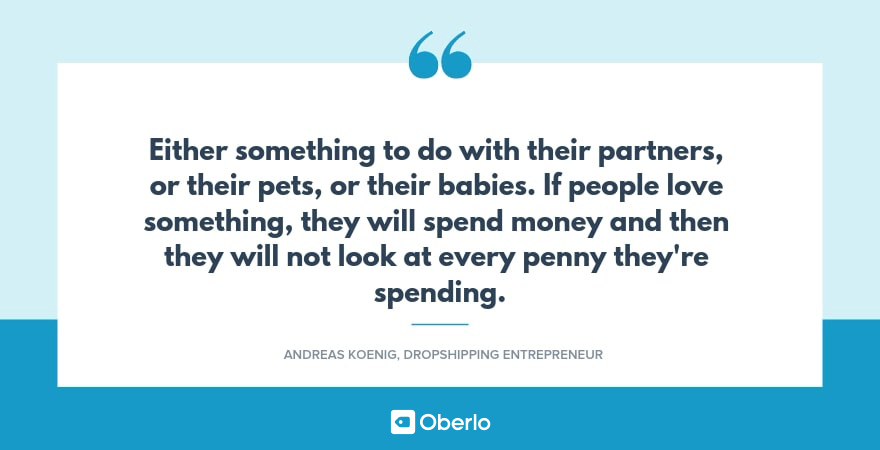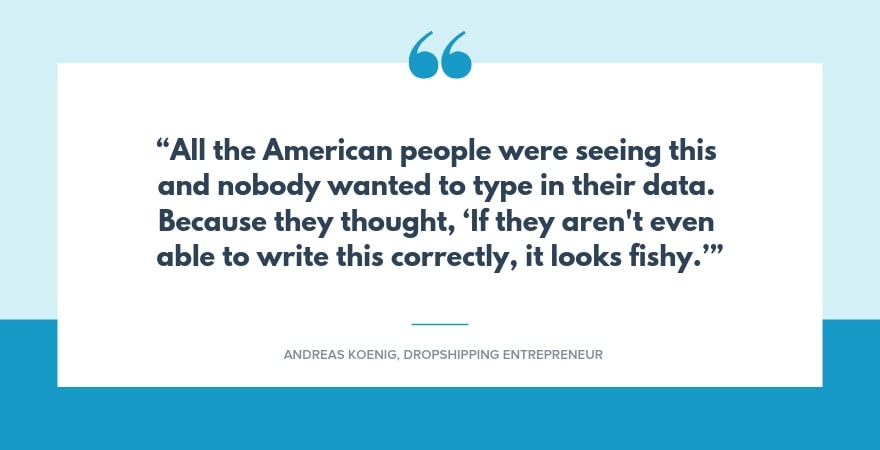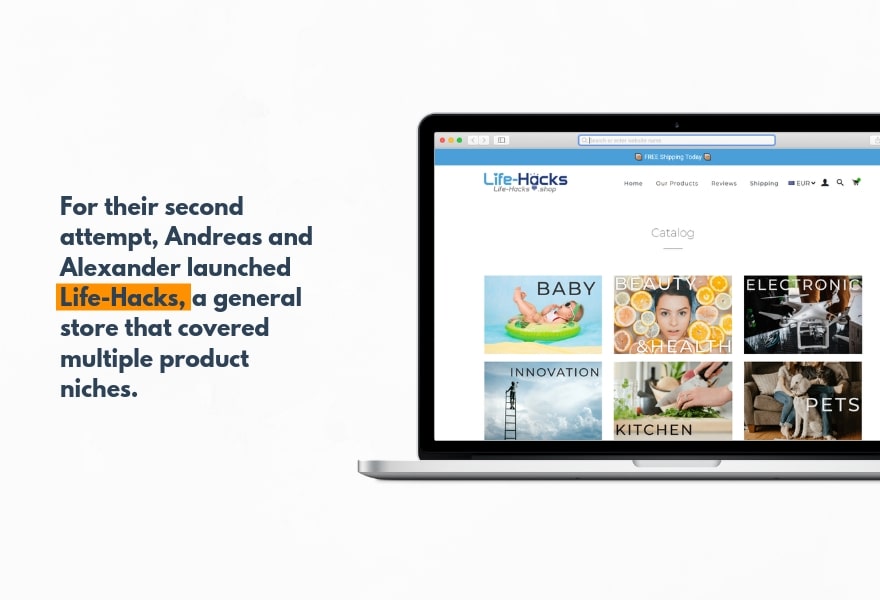Andreas Koenig and Alexander Pecka have always known what they wanted.
“I always knew I wanted to be self-employed. I never wanted to work at a big company and going the straight normal way, I wanted to do my own business,” Andreas says.
Both from Austria, they’ve spent the past six years of their friendship witnessing each other’s journey through entrepreneurship, with all the ups and downs that come along with it.
“We were both looking for a long time for what kind of business we could do,” Andreas says. “We wanted to be really free. If you have a restaurant or something like that, you have to be there and you have to work a lot. We also work a lot, but we work from where we want.”
So in the pursuit of a business they could operate anywhere, they turned to the idea of being an online entrepreneur.
They dipped their toes in the cryptocurrency market, hoping to ride the wave of skyrocketing currency prices. They tried networking marketing too, and dove deep into affiliate marketing.
It was around that time in early 2018 that Alexander first came across the idea of dropshipping.
They were intrigued by the dropshipping ecommerce business model, which would allow them to operate an online store without needing to purchase inventory upfront.
Because their supplier would handle all of their inventory, including shipping orders to their customers, they wouldn’t be bound to a location by warehouses or piles of inventory.
They could operate the business anywhere they wanted. If they went traveling, their business could easily come too. After all, it was operated completely from a laptop.
And best of all, if they built the business, it would be theirs.
“It’s a long term business that cannot crash like the crypto market or networking marketing,” Andreas says. “Those can be there one day, and gone the next day. But this, if you build up an ecommerce business, it’s your business. It’s more stable than other markets, it can’t crash.”
Post Contents
Getting Started as an Ecommerce Entrepreneur
Starting out, they went for dropshipping so they could find products that they could start selling online. Then they created their online store with Shopify, using readymade themes and custom apps.
They were excited to try out this new business idea, and set about figuring out what they could sell. Then, they came across the automatic toothpaste dispenser.
“We saw that there is a big US company that sells it on the television. They sell millions of pieces,” says Andreas.
Even more promising, it hit the three golden rules of a great dropshipping product.
Their toothpaste dispenser was:
- Unique: You couldn’t easily buy it in a store near you
- Difficult to guess the price: So they could set a profitable price for the product.
- Easy to ship: Both lightweight (for cheaper shipping) and durable.
Winner, winner.
They ordered a sample of the product from their supplier, and got to work creating a video to use in advertising.
“We spent two whole days making one really good marketing video,” Andreas recalls.
They launched their store and set up some Facebook ads using the video. Then they sat back, waiting for the sales to flood in.
Except… crickets.
“We had one sale,” Alexander laughs.
Andreas realized now that it was their lack of experience with Facebook advertising that let them down. “The video was good!” he says. “But we weren’t good enough with Facebook ads to be profitable with it.”
So eventually, they made the call.
“After one or two weeks we shut it down because we realized that this store wouldn’t bring us money, it will burn our money,” says Andreas.
Starting a Dropshipping General Store
Their original plan had fizzled out, but they were still determined to keep trying and looking for new products to sell.
So next came Life-Hacks, the general store.
The toothpaste dispenser store was too niche, they decided. They wanted to open a store that would sell a wide variety of products that could attract a large audience.
“We wanted to use it to test products and find a winning product. If we have only one product in our store, we can’t tell if it’s a winning product. It either is or it isn’t. In a general store we had the possibility to test five or six niches. We had different categories like kitchen, beauty, baby products, and pet products,” Andreas says.
They added a wide range of products, and spent hours tweaking their store design and writing up product descriptions for all the items.
In retrospect, Alexander realizes this wasn’t the best approach. “We had 40 products in this store from different suppliers. That was a big mistake,” he says.
The coordination needed to manage the stock levels and relationships between a large number of suppliers was a headache. If a supplier changed their prices, it would immediately affect their margins, and they’d be constantly scrambling to keep up.
On top of that, they realized they had their work cut out for them with marketing.
When they tried running ads on Facebook or Instagram, they found it difficult to know who to target. If their store had something for everyone, then their potential target audience would be… everyone?
Reaching an audience of “everyone” would be just too expensive. It wasn’t going to work.
In the end, they were also scratching their heads about what exactly their store’s brand was, and why anyone would care about it.
“All general stores all over the world look the same. When you have a niche you can do the storytelling better. You can build up a story about the store. In a general store you can’t tell a good story,” says Alexander.
So after unsuccessfully trying to grow the business, they realized it had been the wrong approach for them.
“If you start with a general store you can test your own skills and build your own skills. But it’s hard to get very profitable and big with a general store,” says Andreas.
Alexander agrees. “Yeah, it is possible to be profitable with a general store, but it’s harder. In the future I would only make niche stores, I like it more.”
Starting a Dropshipping Pet Business
Now they were two failed stores deep, and much of their original budget had dried up.
“We built our first stores and it was really, really hard. We had sales but we were not profitable. We burned around $2,000 in Facebook ads and put a lot time into it.”
They knew that there had to be a reason things weren’t working out for them, so they went back to the beginning to figure it out.
From their general store, they had the idea to set up a new store as a pet business. Since people had such strong attachments to their pets, they figured that they’d be excited to spend money on them.

“It’s good to go in a niche that people love,” Andreas says. “Either something to do with their partners, or their pets, or their babies. If people love something, they will spend money and then they will not look at every penny they’re spending.”
They stocked their store with a small collection of pet grooming accessories, toys, and collars. Learning from their experience with the general store, they decided to limit the number of suppliers they had to deal with, and tried instead to import several items from the same supplier.
At first, things with the pet business were slow and they weren’t making any profit. But they were determined to keep learning and getting better.
Andreas remembers the hours they poured into learning to improve their marketing strategies.
“We probably watched one million YouTube videos,” Alexander says, laughing.
They knew they needed to commit fully if this was going to work.
“For this store we stopped all of our other businesses and put all of our time, inclusive of weekends, into the new pet business. We were working really, really hard,” says Andreas.
And as they spent more time learning, they realized some of the mistakes they had made with their previous stores.
“You have to put in a lot of time in writing a very good product description. If English is not your mother tongue, like mine or Alexander’s, it’s very important to have not one typo. Nothing. It has to be perfect grammatically, and no typos. We had one typo in our pet business and this was killing our whole conversion rate!” says Andreas.

Alexander remembers the night he discovered the typo on their website, in a form on their product page. “We wrote ‘tipe’ instead of ‘type’ for a custom field,” he says. “All the American people were seeing this and nobody wanted to type in their data. Because they thought, ‘If they aren’t even able to write this correctly, it looks fishy.’”
So they fixed the typo, and they watched the uptick in their conversion rate.
Andreas then made another small change that resulted in a huge impact.
“At the start the pet business was not profitable,” he says. “Then I added a spin-the-wheel app.”
The spin-a-wheel is an app designed to collect email addresses for your newsletter list from customers by offering them a chance to play a spin-a-wheel game in exchange for a discount code.
Andreas realized that while collecting email addresses would be great for marketing, “The real goal is that the user should shop with the coupon they get.”
At first, the app did well generating email addresses, but he noticed that many of the customers left disappointed after only winning a five percent discount.
“After two weeks I realized that all the people who were shopping in our shop were the winners of 10 or 15 percent discounts,” Andreas says. “So I raised the price in our shop and I let everybody win 10 or 15 percent discounts.”
And this small tweak, well it made a big impact.
“After this change we had 10 times the turnover!” Andreas says, grinning. “In the first days we sold one to two products per day, then we sold 10-15 products per day! From $30 a day to $350-400 a day, and then it kept going up.”
After learning from all their past mistakes, Andreas and Alexander were able to fine-tune their strategy and scale their business. At the end of their first month in October 2018, they’d generated $24,719 in sales. By January 2019 they were close to $150,000, with an average of around $41,000 per month.
What They Learned On the Way To Successs
As they fumbled their way through their early stores, Andreas and Alexander made a lot of mistakes that made their next business better.
When they started their pet business, they focused on getting a few things right. And these made all the difference.
Focus on Your Customers
Andreas and Alexander are dedicated to providing great customer service. They offer their customers 24/7 support through phone and email.
They’ve set up a phone recording with answers to many of the most frequently asked questions, meaning customers can get answers whenever they need them. They’ve also made it a policy to reply quickly to any email that comes through, regardless of the hour.
“Alexander hasn’t been sleeping much!” Andreas says, laughing.
They’re available on Facebook too, and spend a lot of time reading and replying to comments from their customers. “We try to stay very near to our customers, and they love it,” says Andreas.
Develop a Great Relationship With Your Supplier
It’s not just their relationship with their customers that is important to them. They’ve focused on building up a close relationship with the suppliers behind their best selling products. As they’ve grown to understand each other’s businesses, their suppliers can now recommend other products for them to try based off what is selling well.
Recently they’ve been talking to one of their suppliers about developing a range of custom-made products.
The pair is excited about the prospect of creating their own product, and credit their close relationship to both their suppliers and customers with the chance of making it happen.
“We see what the customers are talking about in the comments, and we ask them what they want. If you know a lot of your customers’ thoughts, then you can create a product that they really love,” says Andreas.
Yes, It’s Possible to Compete With Amazon
When many people are first starting out with dropshipping, they’re held back by a particular fear:
Why would anyone buy off me instead of Amazon?
It’s a legitimate question for anyone who is selling a generic product that can be found on other online stores. But Andreas and Alexander have learned it is possible to compete.
Their strategy is two-fold.
The first part is to offer extra value by combining products into a bundle. The bundle they use with their pet business includes their best selling product plus accessories that complement it, which can be bought all at once for a discounted price. Unlike Amazon, they can use bundles like this to offer a better price or more value on their products.
 The second part of their “we can compete with Amazon” strategy is to focus on building their store to feel like a brand.
The second part of their “we can compete with Amazon” strategy is to focus on building their store to feel like a brand.
“People could get it cheaper on Amazon, but on Amazon the marketing is very cold because everything looks the same,” says Andreas.
But when you land on their pet business store, you’ll see photos of cute pets and happy owners. It immediately creates a sense of a branded product, rather than just a generic product sold amongst millions of others on Amazon. And in the end, that makes all the difference.

“If we lose one or two customers to Amazon, that’s fine. But if the price is okay on our store, the product page looks good and the trust is there, then they will not look around anyway, they’ll just buy it from us,” says Andreas. “That’s what happens 50 to 70 times a day, every day. So we’re happy about that!”
Be Ready to Spend Some Money
When Andreas and Alexander first started their dropshipping businesses, they knew that like any other business, it was going to cost them some money. They prepared by setting aside around $3,000 to reserve for testing products and learning from mentors.
“What people really miss is that they need some money to start,” says Andreas. “They’ll need money for ads, for Shopify, they’ll have to register their own sole trader company. There are tax consulting questions, there are law questions. There are lots of little things.”
Alexander suggests that for anyone who is working with a limited budget, the key is to prepare early. “If you want to do this, you should plan for it,” he says. “Maybe work in your normal job and save some money, look at free videos on YouTube, try and build your knowledge, maybe do a little bit of coaching and then you can start spending on ads.”
You’ve Gotta Commit
After two failed stores, Andreas and Alexander were determined to succeed with their pet business and did whatever it took to make it happen.
That meant dedicating serious time and effort to learning and getting better. The pair agree that this is crucial for anyone thinking of starting their own dropshipping business, you’ve just gotta commit. They’re currently spending more than 70 hours per week each working on the business.
“When you want to do well with dropshipping, you have to go for it 100 percent,” says Alexander.
“If you work in a normal job, you should kill your expectation of free time for the next few months. Go to bed with your notebook, watch videos, read blogs, do everything you need to for two or three months. Then you’ll have the basic knowledge. Block time for this, because it’s time-consuming,” Andreas says. “But it’s worth it, it really is.”
Want to chat to Andreas or Alexander about their experience? You can reach out to them on Instagram: @koenig_andreas and @alexander.pecka





